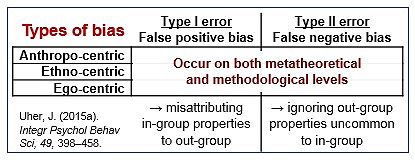Transdisciplinary Research on Individuals
Transdisciplinary
Philosophy-of-Science (TPS) Paradigm
Transdisciplinary Philosophy-of-Science Paradigm for Research on Individuals (TPS Paradigm)
- Philosophical framework -
- Individuals as complex living systems
- Epistemological complementarity
- All research is done by humans
The paradigm's philosophical framework specifies the basic assumptions made about the nature and properties of individuals and the fundamental notions by which knowledge about individuals can be gained (Uher, 2015a, 2018a, 2018c).
Individuals as complex living systems
|
To consider that individuals are living organisms, the TPS Paradigm builds on complexity theories rooted in thermodynamics (e.g., Prigogine), physics of life (e.g., Capra), philosophy (e.g., Hartmann), theoretical biology (e.g., von Bertalanffy), medicine (e.g., Rothschuh), psychology (e.g., Köhler, Koffka, Vygotsky, Wundt) and the social sciences (e.g., Morin). Complexity theories conceive living organisms as open nested systems organised at different levels of complexity, from atoms and cells over single individuals up to societies. At each level, they function as organised wholes in which non-linear dynamics occur from which new properties emerge not predictable from their constituents (principle of emergence). These new properties can feed back to the constituents from which they emerge, causing complex patterns of upward and downward causation. With increasing levels of organisation, ever more complex systems and phenomena emerge that are less rule-bound, highly adaptive and historically unique. This highlights the inadequacy of assumptions any composite could
be known only by knowing its constituent elements (principles of
reduction and disjunction) and of linear methods of data analysis and
modelling, still widely used in research on individuals (Uher,
2018a, 2018c,
Trofimova, Robbins, Sulis & Uher, 2018;
Uher, Trofimova, Sulis, Netter et al., 2018). |
Complementarity
|
For adequate explorations of individuals, the TPS Paradigm builds on the concept of complementarity. It highlights that particular objects of research can be exhaustively understood only by describing two mutually exclusive properties that are irreducible and maximally incompatible with one another, thus requiring different frames of reference, criteria of truth and methods of investigation, and that may therefore be regarded as complementary to one another (e.g., wave and particle properties of light; Bohr). In addition, as Heisenberg showed for physical phenomena, complementary properties of an object of research cannot be simultaneously determined with the same precision (Unschärferelation, literally 'relation of imprecision' but mostly translated as uncertainty principle). These concepts provide important foundations also for research on individuals, as elaborated in the methodological framework. Complementarity is implemented in the paradigm's
frameworks in various ways, such as in concepts about the
psyche-physicality (body-mind) problem
as proposed by Fahrenberg, Walach, Bohr and others (Uher,
2015a, 2015c,
2015d),
in concepts of appropriate
phenomenon-method matching
(Uher,
2019) and to develop solutions for the long-lasting
nomothetic-ideographic
debate in research on individuals (Uher,
2015c). |
All research is done by humans
|
All scientific endeavours are inextricably entwined with and thus limited by human's perceptual and conceptual abilities (Wundt, Peirce). This does not imply radical constructivist assumptions that knowledge could be developed without reference to an existing reality. But it also rejects naïve realist assumptions that individuals' senses could enable direct and objective perceptions of the external reality. Instead, the TPS Paradigm builds on the recognition that we can gain access to this reality only through our human abilities, which inevitably limits our possibilities to get to know about, explore and understand this reality. This epistemological position comes close to those of critical realism (Bhaskar) and pragmatism-realism (Guyon). They emphasise the reality of the objects of research and their knowability but also that our knowledge about this reality is created on the basis of our practical engagement with and collective appraisal of that reality. Therefore, science is inseparable from its makers' particular perspectives on their objects of research given their own positions in the world - as humans, members of particular communities (e.g., culture, language, thought tradition) and as individuals.
Such biases can occur in the phenomena that researchers seek out to explore and the questions they ask about these phenomena (metatheoretical level) as well as in the techniques and practices researchers use to explore them (methodological level; Uher, 2013, 2015a, 2018c, 2020).
|
More information available in Publications and Science Blogs.
© 2013-2026
 This
entails particular risks for unintentionally introducing all kinds of
anthropo-centric, ethno-centric, and ego-centric biases.
This
entails particular risks for unintentionally introducing all kinds of
anthropo-centric, ethno-centric, and ego-centric biases.